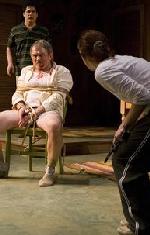SEARCH
REVIEWS
FEATURES
NEWS
Etcetera and
Short Term Listings
LISTINGS
Broadway
Off-Broadway
NYC Restaurants
BOOKS and CDs
OTHER PLACES
Berkshires
London
California
DC
Philadelphia
Elsewhere
QUOTES
On TKTS
PLAYWRIGHTS' ALBUMS
LETTERS TO EDITOR
FILM
LINKS
MISCELLANEOUS
Free Updates
Masthead
Writing for Us
A CurtainUp DC  Review
Review
 Review
ReviewDeath and the Maiden
by Rich See
|
What do we lose by killing one of them? What do we lose? ---Paulina Salas |
 T. Sandoval, S. Rowe and M. Sandoval
(Photo: Richard Anderson) |
Set in an unnamed country (presumably Chile) which has just emerged from a Fascist dictatorship, the story centers on a husband and wife who provide a bed for a stranger at their secluded beach house. The wife -- a victim of torture by the military -- recognizes the voice of the guest as one of the doctors who raped, beat and sadistically persecuted her 17 years earlier.
Mr. Dorfman creates a makeshift court as wife accuses guest and husband, a lawyer, takes on the defendant's case in order to assure that the doctor is not murdered by the wife. It's an interesting cat and mouse game as husband and wife vie against each other and the doctor -- who insists he is innocent -- conspires with the husband to gain his freedom. In the end the tables are thrown aside as the wife gains the upper hand in a finale that will leave many wondering what exactly took place. It's the play's one weak spot, but Death and the Maiden is still worth your attention and a trip to CENTERSTAGE to experience a play that is a precautionary tale about how governments can swiftly move out of balance and human rights can quickly be ignored.
Director Lillian Groag brings this three-person piece to life with a great cast and an interesting manner of presenting dark against light. Everything in the play -- except the script -- is very light and airy. Todd Rosenthal's set is a modern-style beach house comprised of tan wood paneling and a fading sunset out the sliding glass doors. Martha Hally's costumes are summery outfits, while Mark McCullough's lighting is bright and seemingly natural. Paul Peterson's opera music mixed with ocean waves adds a nice juxtaposition to what is about to ensue when the stranger, Dr. Roberto Miranda, arrives.
In the cast, Mhari Sandoval, as Paulina Salas, creates a seemingly happy woman who is waiting for her husband to come home one summer's night. It's not until a car pulls in and the woman reaches for a pistol that you begin to realize not all is well, here at the beach. While she does an admirable job portraying Paulina's happy nature, the presentation is a bit overdone to make a point of showing the residual effects of torture. However, Ms. Sandoval shows her talent when she becomes a mix of gritty humor and cold callousness when she takes Dr. Miranda hostage in her home. It's at this point the play finds its wings and she steers the flight as she walks about her living room toting a pistol and duct taping the unconscious doctor. Thus one minute she can be recounting the horrors of her torture and the next growl a command like "Come on doctor, stand up. I don't want you pissing all over my rugs." which brings tension relieving laughter to the audience.
As her husband Gerardo Escobar, Triney Sandoval is a mix of official political voice and concerned spouse. While it is obvious that he is wondering if his wife has gone mad, you can also tell he is just as worried about his new job as the head of a human rights commission to investigate military abuses during the Fascist regime. This is not a completely stable marriage and it becomes apparent in what is said and unsaid between the spouses. Mr. Sandoval does a nice job of playing a confused husband, who is only half-heartedly going along with his wife's murderous plan in an attempt to save everyone involved.
Stephen Rowe presents Dr. Roberto Miranda in such a straightforward manner he makes you wonder about his guilt right up until the end of the play. This uncertainness leaves you to ponder if Paulina's quest for revenge is justified or misguided. At what point does vigilante justice simply become more torture and sadistic killing? Is she justified in taking the law into her own hands? Especially when she realizes that nothing is ever going to occur to the guilty since the commission will investigate the crimes of those killed during the Fascist regime, but will not prosecute any of the perpetrators. Nor will it even divulge any of the names of the guilty parties. The entire play leaves you pondering your own blood lust and wondering at what point is forgiveness and moving forward -- on both the personal and political levels -- required by all individuals involved. It's this idea of the price of forgiveness that makes the play interesting and moves its two hour time frame along quickly. You are left with many questions for discussion and contemplation with your theatre companions or with yourself.
|
Death and the Maiden
by Ariel DorfmanDirected by Lillian Groag with Mhari Sandoval, Triney Sandoval and Stephen Rowe Scenic Design: Todd Rosenthal Costume Design: Martha Hally Lighting Design: Mark McCullough Sound Design: Paul Peterson Fight Director: J. Allen Suddeth Running Time: 2 hours, 15 minutes with 1 intermission Centerstage, 700 North Calvert Street, Baltimore Telephone: 410-332-0033 http://www.centerstage.org TUE - SAT @8, SAT - SUN @2, SUN @7:30; $10 - $60 Opening 10/26/06, closing 11/26/06 Reviewed by Rich See based on 11/10/06 performance |


